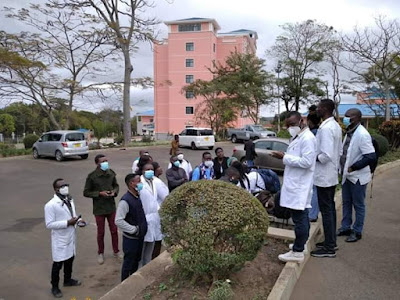Analysing the COVID-19
crisis in developing countries like Malawi, it is apparent that managing the
spread of the pandemic comes at a cost. This article aims at highlighting some
of the social costs that as a society we are paying in order to manage
COVID-19. There are so many social costs that we are paying as individuals and
communities. This article will not highlight all the issues; rather it intends
to bring awareness on some of the issues that may be overlooked due to the
overwhelming nature of corona virus disease.
Psychosocial
Trauma for Health Workers
Along with its high infectivity and fatality rates, the 2019 Corona Virus Disease (COVID-19) has
caused universal psychosocial impact by causing mass hysteria, economic burden and financial losses. Of specific interest in Malawi are the Health care workers. In addition to minimal wages, lack of equipment and inadequate training, health workers risk their lives every day taking care of infected patients, witnessing higher rates of death and experiencing breakdowns of protocol and support. These acute stresses could lead to mental health issues, yet therapeutic support is also not sufficient. We hope that our government will recognize these sacrifices and put in place measures that will support the mental wellbeing of health workers.Blame Game between Urban
and Rural Settlers
The origin and the
spread pattern of COVID-19 in Malawi have the background related to foreign
travel usually by the population in urban communities. This has created a
notion where by rural settlers shifting the blame to the urban community. One
interviewee bluntly said ‘the people that travel in and out of the country are
responsible for the spread of COVID-19 in the country’. This line of thinking
has seen some communities refusing to welcome their relatives from Republic of
South Africa due to the fears that there are more COVID-19 cases where they are
coming from. This comes barely weeks after 400 returnees escaped the quarantine
centre creating fears of an outbreak within the urban community. Some of the
returnees complained that the stadium (quarantine centre) had no water, no
toilets and the government was not providing them with food https://www.nyasatimes.com/malawi-at-risk-400-returnees-escape-from-covid-19-test-centre-in-blantyre/
Now that the
campaign period is over, new government has been sworn in, hopes are high that
the new government will prioritize public safety and welfare. Hopes are high
that COVID-19 management will be more effective.
Increased Cases of
Teenage Pregnancies
Managing the spread
of COVID-19 in Malawi comes at a high social cost especially for adolescent
girls. Schools are still closed since 23rd March, 2020. This new
normal has definitely added the burden on parents. For most parents, sending
kids to school is one way of making sure that their children are occupied with
productive learning tasks. Having schools closed means that children stay at home
most of the times, if they are not home parents get more worried.
As the COVID-19
pandemic rages on, the number of women unable to access family planning, facing
unintended pregnancies, gender-based violence and other harmful practices could
skyrocket by millions of cases in the months ahead https://malawi.unfpa.org/en/news/new-unfpa-projections-predict-calamitous-impact-womens-health-covid-19-pandemic-continues-12
COVID-19 will
disrupt efforts to end child marriage. Adolescence is a time of transitions
that foster both challenges and opportunities. Indeed, choices made during
adolescence not only have immediate consequences but also greatly influence the
economic opportunities, health outcomes, and skill sets attained later in life,
and yet it is the same period when social norms create pathways largely defined
by gender. COVID-19 is creating loopholes for high rates of teenage
pregnancies.

No comments:
Post a Comment